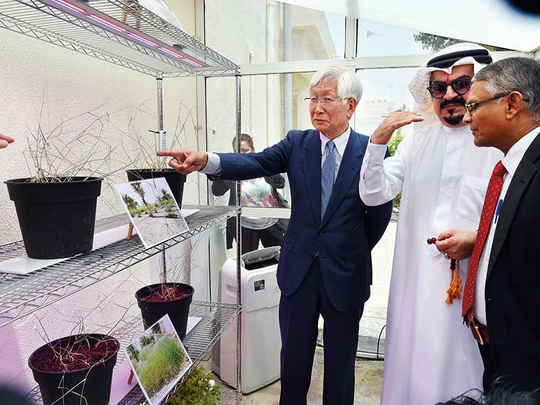
Abu Dhabi: At first glance, the glass structure is nearly inconspicuous with a few neatly arranged saplings. Through it however, students at the Shaikh Khalifa Bin Zayed Bangladesh Islamia School are gaining a chance to learn about environmental sustainability and conservation in a hands-on manner.
The school, one of the capital’s most sustainable educational institutions, today inaugurated the 12.5 square-metre conservatory in the presence of leading environmental and educational experts and officials.
“Environmental conservation is our responsibility towards our planet, and that is why every initiative to support conservation is a step in the right direction. We have long strived to promote sustainability, and this conservatory is another project that will enable our students to learn about environmental advocacy, innovation and technology,” Mir Anisul Hasan, principal at the school, told Gulf News.
One of the first projects will involve the growing of tamam, a desert bunch grass eaten by camels and racehorses.
“It is not easy in the hot, arid desert climate to grow plants and promote biodiversity. This is why it is essential to learn and understand the exact conditions that promote plant growth, which is what our students will be able to see and learn about first-hand,” said Anita Saul, environmental coordinator at the school.
The conservatory will eventually be powered by solar panels to make it a zero-energy project. It also contains an atmospheric water generator in order to further reduce the environmental footprint.
“Environmental issues may seem insurmountable at times, but I honestly believe that we must rely on young minds for viable, innovative solutions. This project is a perfect example of how youth can be engaged in conservation, and I hope the school can create successful models to demonstrate how environmental issues can be addressed,” Dr Tomihiro Tanaguchi, Japanese Nobel Peace Prize laureate, nuclear energy expert and sustainability advocate, said at the launch.
The school has already been recognised multiple times for its environmental leadership by the emirate of Abu Dhabi’s environment sector regulator, the Environment Agency Abu Dhabi. In 2013, it also received the prestigious Zayed Future Energy Prize for Global High Schools in Asia. Its proposal aimed to harness solar power for energy, and set up traditional wind towers for cooling purposes.
Since then, the school has installed solar panels on the roof that supply 30 per cent of the total energy required, including all the power for the operation of its lights, fans and computers. Not resting on its laurels, it is also working to become the first passively-cooled school in the Middle East through the use of the wind towers.
“Another plan aims to recycle greywater and reduce current levels of water consumption by 50 per cent,” Saul said.
Raha Islam, 18, a Grade 12 student at the school and the president of its Eco Club, said she was very excited about the new conservatory.
“I have always been passionate about biodiversity, and this project will give me a real chance to learn about, and promote, it. We are all especially excited about the water generator,” she said.












